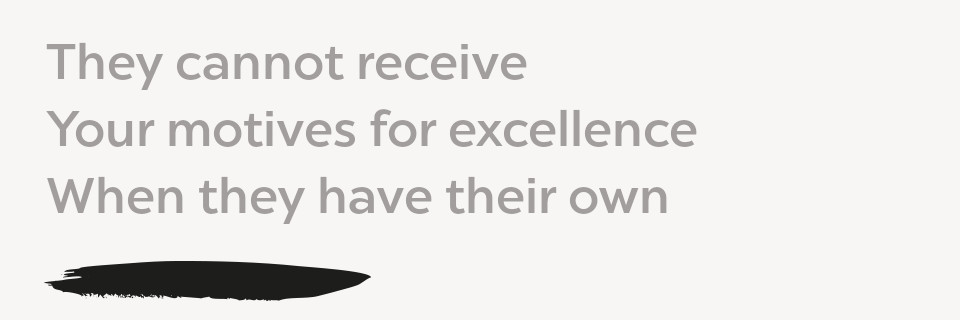The first time I got fired, I was twenty-three. It was 1997 and I’d just completed nine straight lazy summers as a lifeguard and swim instructor, followed by a disastrous attempt at substitute teaching in the Bay Area. Unpredictable, early hours and hardened city kids ate me alive. When it drove me to afternoon drinking, I knew I had to find something else. I’d moved to San Francisco to study with some of the greatest Aikido teachers in the world—that mattered to me more than anything. The only reason I worked was to pay for rent, food, and—most importantly—my mat fees.
The company I found, called IBE (International Business Education), sold distance learning programs for a few different UK institutions. This was my first 8-5, button-down shirt, “real-job,” and I didn’t realize just how out of my element I was. They trained me to field an 800 number, answer basic questions, take addresses, and mail brochures. It seemed simple enough, but I wasn’t nearly as good at the job as I thought. My self-image was thick.
I remember my boss (who looked like Kevin Nealon) pulling me aside and kindly inviting me to raise my level of formality. He cited an example where a prospect said, “I’ve got some questions for you” and I responded with “Let ‘er rip!” I still laugh at myself today about that one. From my perspective, I created a relaxed, easy rapport. But from management’s point of view, they needed a professional voice that represented higher business education. And, well, I really thought I was listening.
But I just couldn’t stop myself from doing things like adding a line about the the best burritos in the Mission in a form letter for someone who’d just moved there. After realizing how inappropriate it was, I feared for a week that my boss might have seen it. I began to feel more and more dread at work.
Data entry was expected to be meticulous. P.O. boxes, for example, must have a period after the P and the O. We had to write out words like Road and Avenue for some reason. “Clean data is valuable,” my boss said, “And we intend to sell this list one day.” I didn’t see myself as detail-oriented, and I found working in the database tedious and boring. Every few days, my boss showed me the mistakes I had made on reports he ran. I started to resent him, because he never broke from his oppressive sobriety and never enjoyed a joke. He was as boring as the database.
It was a Friday just after lunch the day it happened. I don’t remember what my boss said, nor what his boss said in the second meeting. All I remember is how I felt. Shocked, nauseated, and afraid. I was incapable of processing the experience. I went home and cried myself to sleep.
The next night, at Aikido, one of my teachers stood next to me on the edge of the mat, tying his belt. “How ya doing?” he asked.
“I got fired,” I admitted, crestfallen.
“Congratulations! That’s an important experience to have!”
He was right, of course. But I wouldn’t understand the value of the experience for years. And why I didn’t is the same reason I got fired.
The truth is, I was an arrogant kid who deserved to get fired. But management failed as well, and here’s how.
While the job indeed may have been some life-destiny-foreshadowing of my coaching career that began five years later, I didn’t care at all about what they did. All I cared about was martial arts, and my behavior showed it. I couldn’t have cared less about the difference between “PO Box” and “P.O. Box.” But the difference between having my front foot pointed straight toward my opponent or slightly outward—that mattered.
You see, I wasn’t incapable of detail-orientation. I just needed a reason that mattered to me.
I talked with my Aikido teacher more about what happened later that week. He mentioned that he used to wait tables before he opened a dojo.
“Yeah, I used the restaurant to practice Aikido,” he said plainly, as if it were obvious.
“How?” I asked, not following.
“Well, I made it a kind of game. I’d pay such close attention to my tables that I’d fill their water glasses before they even realized they were low. If they needed me, all they had to do is turn their head to look, and I was right there. If I could do that well for eight tables, for twenty-five people, then I knew I could handle a five-person attack. Plus, I got better tips.”
That was the beginning of me learning a work ethic. More importantly, though, I learned the importance of aligning my self-interest with what whatever was before me. This, I discovered, was the path to greatness, not just in work but in life in general.
These were the dots I needed “Kevin Nealon” to connect for me, but he expected me to care about what the business did without knowing anything about me.
If you’re a manager, maybe you’ve experienced how not-far that goes. Maybe you’ve seen it in your own work.
Personal, self-interested engagement is everything. If you want extraordinary results, you need employees who are “all in,” and not for your reasons, but for theirs. Effective managers connect the work to the motives people already have.
So how can you do this? So glad you asked. 🙂 All of this (and more) is the subject of my upcoming live course: The Art of Self-Management: How to Make Work Not Suck. Get all the details here and find out about early-bird pricing.


